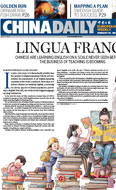Economy
Health supplements bring in the business
Updated: 2011-02-28 10:17
By Tang Zhihao (China Daily)
|
 |
|
An elderly customer examines health products on the shelves of a pharmacy in Zhengzhou, the capital city of Henan province. [Photo / China Daily] |
However, experts are advising senior citizens to be cautious when choosing which food supplements to buy.
According to a survey jointly conducted by China News Weekly and Tencent-owned www.QQ.com on the Internet, some 60 percent of the 1,929 families surveyed said elderly relatives living with them bought health foods and devices to make their lives easier. More than 30 percent of those surveyed said items often cost more than 1,000 yuan ($151.95), some were even more than 5,000 yuan.
"Senior citizens, especially those who have a stable monthly income, want to live long, healthy lives. Some of them will take nutritious products to lower the chance of contracting some age-related conditions," said Gao Jian, an expert in nutrition at Zhongshang Hospital Fudan University in Shanghai.
Total sales of health supplements have reached 100 billion yuan over the past few years, according to China Food Quality News.
Naobaijin (melatonin), one of the nutritional supplements developed to improve sleep quality by Giant Interactive Group in China, generated revenues of more than 10 billion yuan between 1998 and 2008, although there is some skepticism about the effectiveness of the product.
"I do not know whether the health products are as effective as the sales literature makes out, but I am sure my mother was quite happy to take the daily supplement," said Liu Hui, a white-collar worker in Beijing. "I will not stop my mother buying health products unless they are not good quality."
| ||||
A report from Ogilvy Public Relations Worldwide said the annual per capita spending power of senior citizens would increase from $1,620 in 2005 to $4,112 in 2015. The makers of health supplements both in China and overseas are keen to develop the market, confident it has great potential.
"As the population of China gets more wealthy and educated and pays more attention to health, including such conditions as osteoporosis, the demand for bone health products will undoubtedly grow," said Char-Le Wang, general manager of Fonterra Brands China.
Wang said Fonterra is planning to introduce more products into the Chinese market over the next few years. At present, Fonterra has only one product designed for the elderly on sale in China.
"Milk products designed for senior people sell very well and sales have maintained a high growth rate over the last few years," said Zhang Jianqiu, executive president and spokesperson of Inner Mongolia Yili Industrial Group, without revealing precise figures. "We are planning to give a long-term commitment to exploring the market for the elderly."
A report by Euromonitor in 2010 pointed out that as the number of senior citizens in China continues to accelerate, the older demographic "will increasingly become a strategically important consumer base for health and wellness industry players".
Although this market is booming, experts said senior citizens should be careful in choosing which supplements they purchase. The elderly are advised to seek the advice of a doctor before taking health products.
E-paper

Chinese tourists as top shoppers
Since last summer, Chinese tourists emerged as the top tax-free shoppers in Europe.
Golden run ahead
Looking abroad
Mapping out a plan
Specials

The green lantern
Environmental concerns are shedding new light on a colorful tradition

Inland interchange
Chongqing bets on its position as a hub for China's west.

Zooming in on Chinese skies
Helicopter companies ride on country's growing interest in luxury aviation.




